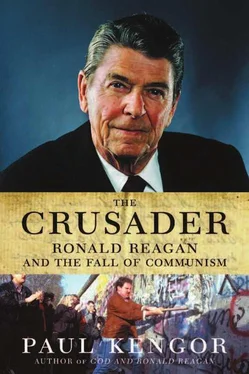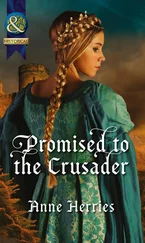There were a number of Grove City College students who were especially helpful. Among my excellent researchers were John McCay, Jen Velencia, Hans Yehnert, Jeff Chidester, Betsy Christian, Allan Edwards, Leah Ayers, Jennifer Moyer, and Melissa Harvey. John vetted all of the publicly available Reagan Presidential Documents, which cover 10,000 pages of text. This is a massive, official record of every presidential statement. Any document that featured key words like “USSR,” “Communism,” “Poland,” “Brezhnev,” and so forth was flagged by John—before the collection was transferred online! Jen Velencia searched various newspaper archives for all pre-presidential references to Reagan from the 1940s to the 1970s; this was done for the New York Times, Washington Post, and Wall Street Journal, as well as a number of select California papers and conservative publications. Jennifer Moyer stepped up and dug out articles buried even deeper from the 1940s. Betsy Christian (with the help of Henry Johnston) read issues of Pravda (in Russian) from October through November 1947.
Melissa Harvey’s work was particularly impressive. She completed a comprehensive search of Reagan material from Soviet newspaper and media archives—a volume of incredible material that, to my knowledge, only I possess. Melissa flagged all Reagan references from the 1950s through 2000 in the archives of FBIS and the Current Digest of the Soviet Press. FBIS is the Foreign Broadcast Information Service, which on a daily basis has long translated all foreign media—print, TV, radio, etc.—and published it in the United States. Through FBIS, I obtained Soviet and Eastern bloc opinions on Reagan. I was able to peruse innumerable analyses of Reagan by the likes of Pravda , Izvestia , TASS, the Moscow Television Service, and untold others. This involved thousands of articles. It was because of Melissa’s research that this book is titled The Crusader. Indeed, I had once read in a 1996 book by Norman Wymbs that “inside the Kremlin,” Reagan was referred to as “Crusader.” This was news to me. I searched but couldn’t confirm the reference. I called Wymbs in September 2001. He couldn’t remember his source for the reference. I soon forgot about it. Yet, once I found countless examples of numerous Soviets calling Reagan “the Crusader” in media archives, I quickly sensed I had an unexpected title for this book.
Also among Grove City College students, Elaine Rodemoyer meticulously incorporated my handwritten edits from many drafts. When she graduated, Rachel Bovard completed the final round. I’m very fortunate to teach at a college filled with extremely intelligent, honest, hard-working, unselfish, and reliable students. Likewise helpful was Grove City College’s splendid library staff, particularly Joyce Kebert.
I must also express appreciation for the spectacular research of Martin and Annelise Anderson and Kiron Skinner, who have uncovered thousands of Reagan handwritten documents, from letters and speeches to those eyeopening radio broadcasts. In so doing, they’ve produced a treasure trove for researchers like myself to ascertain the real Reagan. Their good work will live on for many years to come. All future Reagan scholars owe them.
Special appreciation goes to Marko Suprun, who brought to my attention the Chebrikov-Andropov letter on Ted Kennedy. Marko knows the horrors of Soviet Communism; his father survived the 1930s Ukrainian genocide. Herb Romerstein, the authority on the Venona papers and Soviet archives, first provided the document to Walter Zaryckyj, who turned it over to Marko for translation. They were all very gracious. Walter is correct in referring to Herb as a “national treasure.”
I should note here that at least a half-dozen independent sources, scholars with rich expertise and experience in working with the Soviet archives—all of whose names appear in this Acknowledgments section—carefully read the Chebrikov-Andropov letter and judged it authentic. None had any doubts. Richard Pipes, the Harvard professor of Sovietology, who has been a member of the Harvard faculty since 1950 (he is now professor emeritus), told me that he believes he had read the document before, probably in Moscow in 1992 when he was doing archive work on the Lenin papers. This was the period when the London Times reported on the document and on John Tunney’s travels to Moscow on behalf of certain U.S. senators. The Times featured a photograph of the upper left corner of the document, which listed the person to whom the letter was directed, plus some added information. Very careful, diligent research left no other conclusion than that the document is legitimate.
I also thank my agent, Leona Schecter, for her hard work and persistence, as well as her husband, Jerry, for his excellent advice. I cherish their friendship.
I also cherish my friendships with Peter Schweizer and Chuck Dunn. When I first suggested the concept for this book, I suggested it to Peter, with the intent of prodding Peter (not myself ) to write the book. Peter responded: “Maybe you’re the guy to write that one.” About the same time, Chuck Dunn, a Grove City College dean, impressed upon me the importance of book writing generally. They created a monster.
Looking back, the actual writing of the book began even before Peter and Chuck as an independent study supervised in 1995 (and the research started well before then) by my doctoral advisor at the University of Pittsburgh, Paul Y. Hammond, a gentleman, a scholar, and a mentor. Pitt has been lucky to have him all these years.
Another early influence was Lee Edwards, who has now been publishing material on Ronald Reagan for five decades.
I also appreciate the support of Grove City College colleagues, especially Michael Coulter, Marv Folkertsma, Lee Wishing, John Sparks, Bill Anderson, John Moore, and Dick Jewell.
I’d like to reiterate my love for my wonderful family, my wife Susan and four children, Paul, Mitch, Amanda, and Abigail, and my parents, Paul and Gloria. To my father: thanks for working so hard to turn around that clueless teenager. To Susan: thanks for helping me block out the time to write, not to mention so much more than that. I’ve been blessed with much more than I deserve.
Finally, I’ve benefited mightily from the publishing savvy of Judith Regan and the editorial skills of the superb Cal Morgan and Matt Harper. If not for Matt’s fantastic guidance, this book would not read the way it now does (that’s an understatement). Matt did a truly magnificent job. And I greatly appreciate the support of a number of foundations: grants for this book were provided by the Smith Richardson Foundation, the Earhart Foundation, and the Historical Research Foundation. Earhart was kind enough to provide two grants, including a second grant for the summer 2003 trip to the Reagan Library.
Most notably, the first person to support this work was an unheralded entrepreneur from Pittsburgh named B. Kenneth Simon, who became a friend. I was deeply saddened to learn upon my return from a summer of research at the Reagan Library in 2003 that Ken had unexpectedly passed away. Ken so much wanted to see this book completed. This book is dedicated to him.
Paul Kengor Grove City, Pennsylvania April 17, 2006
Abramowitz, Mort, 259
Adelman, Kenneth, 231, 275–76
Afghanistan
Gorbachev and, 275–77
NSDD-166 and, 232–37
Reagan’s policy toward, 230–32
Soviet invasion of, 58
Soviet Union and, 228–30
Soviet withdrawal from, 273–75
use of Stinger antiaircraft missiles in, 257–60
Aganbegyan, Abel, 185
Albright, Madeleine, 194
Alexander, Andrew, 143
Allen, Richard V., 40, 42, 86, 112, 166 on alliance with Vatican, 139
as head of National Security Council, 74, 94
Читать дальше












